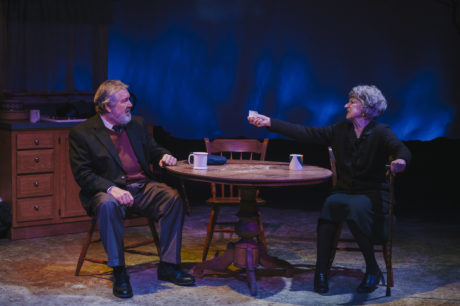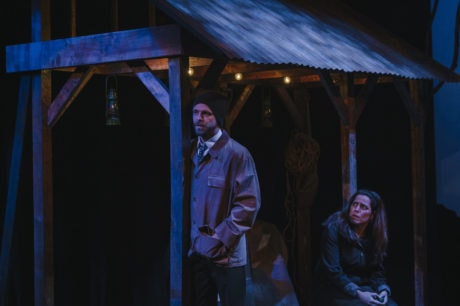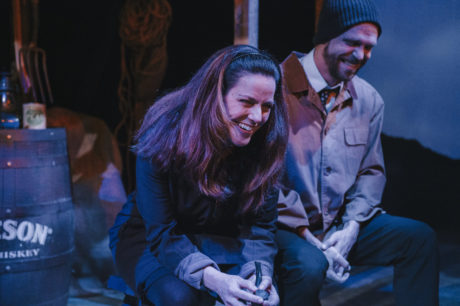How does a play that starts out about real estate for gosh sake—adjacent farms in rural Ireland—become a heart-wrenching story of adjacent lost souls who fall in love late in life? How does a play that starts out prosaically about inheritance rights of all things—who gets one of those two farms after its paterfamilias passes—become so achingly soulful that watching it makes one’s eyes well? Such is the ineluctable emotional through-line of John Patrick Shanley’s beautifully written Outside Mullingar, now playing in a breathtakingly moving production at The Keegan Theatre.

I see a lot at Keegan and there’s a lot to see. Eight shows alone his season, the company’s twentieth. I’ve written about some of my fave plays: most recently Six Degrees of Separation, What We’re Up Against, The Lonesome West. But when I walked out of Outside Mullingar—directed by Producing Artistic Director Mark A. Rhea with what seemed inspired grace—I knew that I had just seen Keegan at its best. I loved the show. I loved it so much that I’ve been struggling over how to say why.
My DCMetroTheaterArts colleague Ravelle Brickman has given a clear overview of the excellent staging and acting along with intriguing details about the narrative. If you want a properly descriptive evaluation of the production, be sure to read her review. Because what I have to say is something else, something completely subjective, something about how the play might affect some people personally.
Outside Mullingar at its heart is about reluctance to love. The inhibitions that cancel out connecting. The emotional lockdown that happens inside when being open feels unsafe. The incessant inner tape loops that drown out anyone else’s heartbeat and stifle one’s own.

That theme is most embodied in the character of Anthony, who is played by Brandon McCoy with such touching introversion and vulnerability you’d think he’d be more comfortable all by himself. He’s 42, and he was so devastated by a girl’s rejection when he was 16 that for the last 26 years he has lived entirely inside himself, convinced he is an unlovable weirdo, with zero inclination to ever fall in love again.
And here’s where all the real estate and inheritance stuff comes in. It’s plotting about plots of land, but it’s about much more than that. It’s the farmland framework in which an unlikely love takes root and blooms.
The family farm Anthony lives on is owned by his brusque widowed father Tony (given a first-rate performance by Kevin Adams), who is near death. He doesn’t want to leave the land to an only son who’ll have no heirs.
Next door is another family farm that is owned by Aoife (the marvelous Rena Cherry Brown playing cranky geriatric delightfully). Aoife has just buried her husband and is looking toward the grave herself. Unlike Tony, who resents his son’s unweddedness, Aoife fully intends to leave her farm to her thirtysomething unmarried daughter Rosemary. And just like Anthony, Rosemary is romantically all alone.
Unbeknownst to Anthony, Rosemary has been fond of him for years and pines for him to notice her and reciprocate. Susan Rhea in the role is one wonderfully tough cookie, a go-getter dynamo. Watching Rhea’s Rosemary determinedly woo McCoy’s diffident Anthony is to be caught up in an emotional anticipation that Shanley’s script sustains with astonishing sympathy and suspense and that they each play out in pitch-perfect two-part harmony.
Deepening the play’s theme of reluctance to love is a pivotal scene that takes place in Tony’s bedroom on what is about to be his deathbed. Tony reveals to Anthony how he came to fall in love with Antony’s mother, years into their marriage, which for Tony to that point had been loveless. Tony explains how he experienced a transformation in his heart— “The quiet hand of God touched me so soft I thought it was the breeze.” Tony promptly sells a parcel of his land to his neighbor in order to buy his wife a gold ring to replace the brass one he gave her on their wedding day. That parcel and that ring are to play a big part in the plot. But what happens in the moment between Tony and Anthony—in the most-choked-me-up father-son scene I can recall seeing on stage—is a transmission of parental permission to love, and a father’s modeling for his son how.
For his part Anthony believes himself so odd no one would have him. He discloses to Rosemary that he believes himself to be a honeybee—something he told the girl he fancied at 16 and it made her flee. Rosemary is acceptingly nonplussed but curious. She asks him what he believes her to be if he’s a bee. A flower, he tells her. A beautiful flower.
We just know they’re going to get together. They have to; this is a comedy. What perverse playwright would string us along with two characters who would totally complete each other if only they knew it, then dash our hopes with a brutal breakup?

But Shanley’s poetic score for these two characters’ heartstrings has a rare sostenuto to it that is sublime pure pleasure. The play’s precisely paced procrastination—all the awkward delays, all the missed cues, all the emotional baggage that keeps popping up between Anthony and Rosemary—is as mesmerizing edging to a pulse-pounding orgasm.
The play isn’t about estate planning; it’s about heart opening. It’s about solitude ending. It’s about risking intimacy over isolation. It’s about courage to come out of one’s shell. And it’s about the best love story I’ve seen on stage.
Running Time: Two hours, including one intermission.
Outside Mullingar plays through May 28, 2017, at The Keegan Theatre – 1742 Church Street NW, in Washington, DC. For tickets, call (202) 265-3767, or purchase them online.






Terrific column. It really adds another dimension to our understanding of the play, and provides another reason for seeing it now.